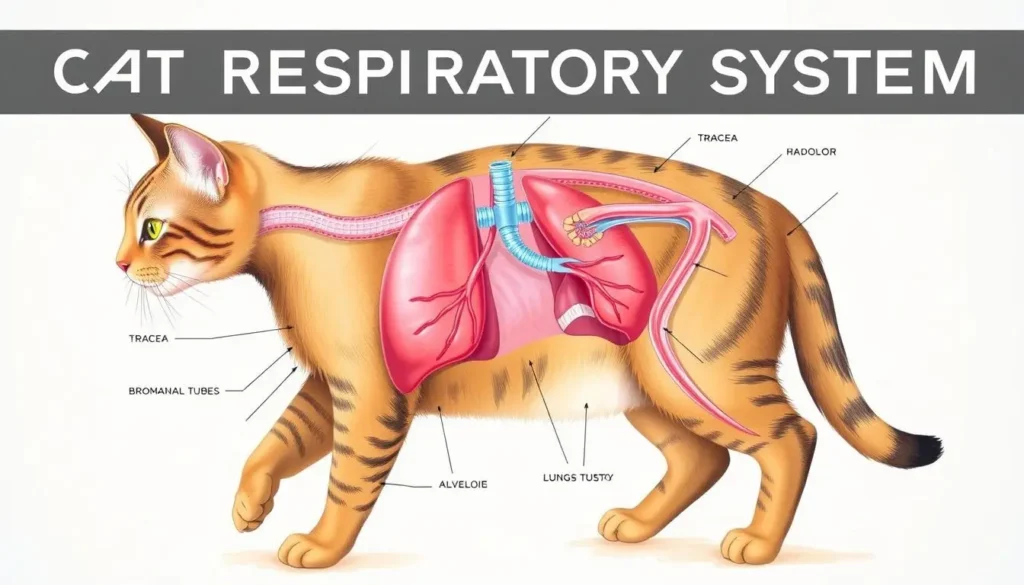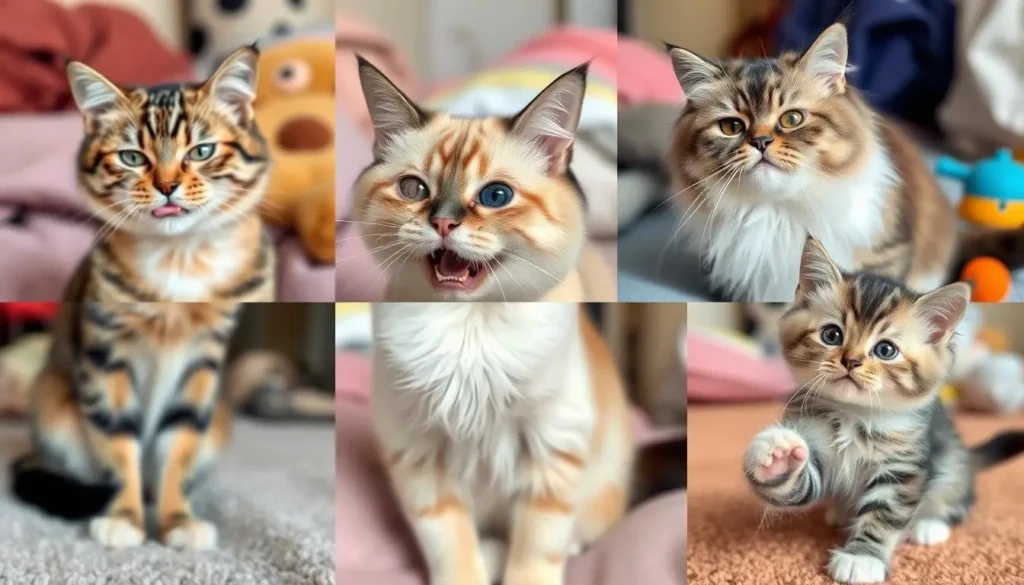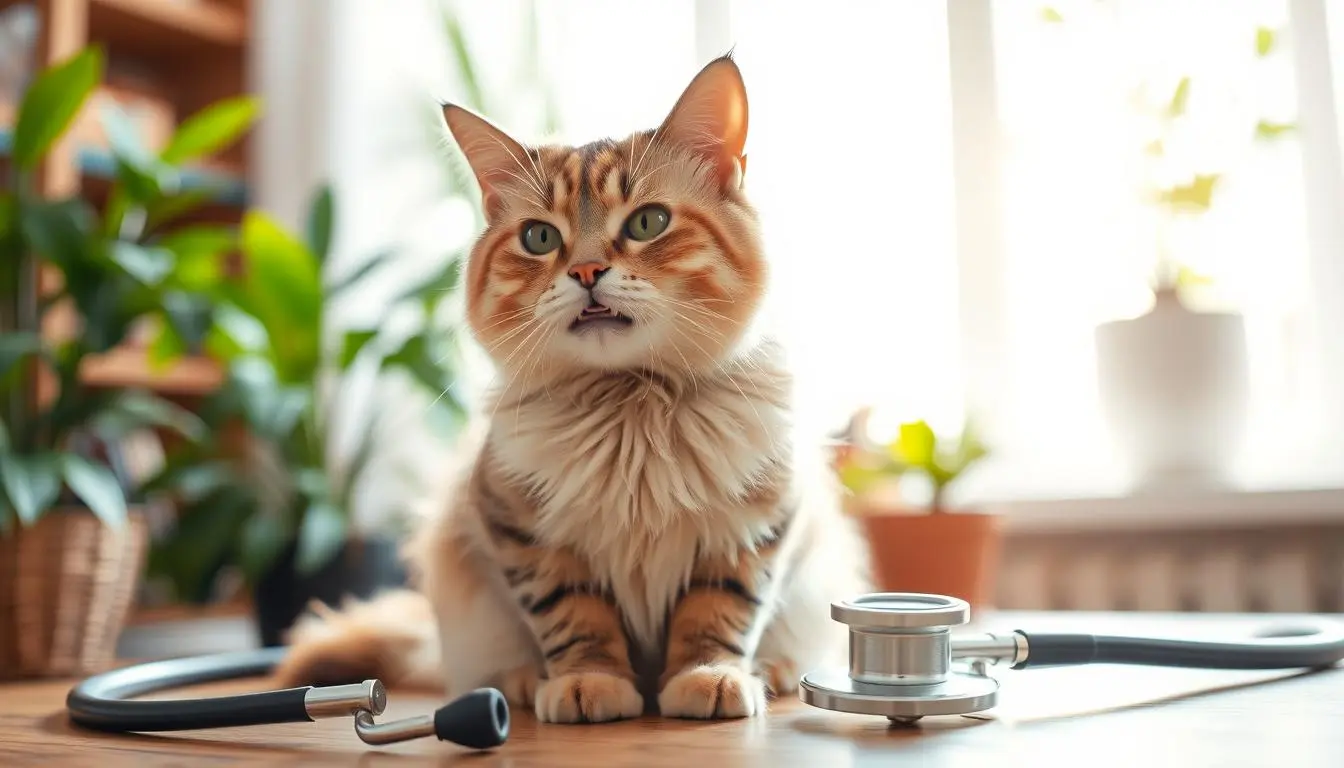Table of Contents
As a cat parent, hearing your cat cough can worry you a lot. That raspy sound might mean something serious. Understanding cat coughing is key to keeping your pet healthy.
Cat coughing is not common but can show serious health issues. If your cat coughs a lot, watch for warning signs. There are many reasons for a cat’s cough, from environmental factors to medical problems.
About 1% to 5% of cats face respiratory issues like asthma. Cats between 2-8 years old are most at risk. Knowing about feline respiratory issues and when to see a vet is vital.
Key Takeaways
- Cat coughing can signal various health concerns
- Respiratory issues are more common in cats aged 2-8 years
- Environmental factors play a significant role in feline respiratory health
- Regular veterinary check-ups are essential for early detection
- Not all coughs indicate serious medical conditions
Understanding Cat Respiratory System and Coughing Mechanism
Your cat’s respiratory system is made up of many parts. It helps them breathe and keeps them safe from harm. Knowing how it works can help you spot breathing problems early.

Cats have a complex respiratory tract. It includes several important parts. These parts work together to ensure they breathe well and stay safe.
How Cats’ Airways Function
The feline respiratory system has several key parts:
- Nasal passages that filter incoming air
- Trachea (windpipe) for air transportation
- Bronchial tubes connecting to lungs
- Alveoli for oxygen exchange
Normal vs. Abnormal Coughing Patterns
Not all cat coughs are a problem. Some coughs are normal, while others might mean there’s a breathing issue:
- Normal cough: Occasional, infrequent, and brief
- Abnormal cough: Persistent, wet-sounding, or accompanied by additional symptoms
“Understanding your cat’s breathing patterns is key for spotting respiratory issues early.” – Veterinary Respiratory Specialists
Role of Mucus and Airways Protection
Mucus is very important for your cat’s respiratory system. It catches dust, bacteria, and other harmful stuff. If there’s too much mucus, it can make your cat cough as a way to protect itself.
By knowing about these respiratory system details, you can keep a closer eye on your cat’s health. This helps you catch breathing problems early.
Common Types of Cat Coughs

Knowing the different types of cat coughs can help spot health issues early. Cats have various coughs, each pointing to different problems. It’s key to know these coughs to see when your cat needs a vet.
Cat coughing symptoms fall into several categories:
- Dry Cough: A hollow, repetitive sound that may indicate respiratory tract irritation
- Wet Cough: A deep, gurgling sound suggesting mucus or fluid buildup
- Hacking Cough: A harsh, forceful expulsion often linked to hairballs or throat irritation
- Wheezing Cough: A whistling sound potentially linked to asthma or allergic reactions
About 1% to 5% of cats have respiratory issues like asthma. Viral infections cause respiratory problems in about 25% of cats. So, watching your cat’s coughing is very important.
“Not all cat coughs are created equal. Each type can reveal important information about your pet’s health.” – Veterinary Respiratory Specialist
If your cat’s cough doesn’t go away, see a vet. Studies show 70% of ongoing coughs are due to health issues like infections or respiratory disorders. If your cat coughs for more than a day or shows signs like tiredness or less appetite, get vet help fast.
Cat Coughing: Primary Causes and Risk Factors
It’s important to know why cats cough. They can get different respiratory issues that make them cough. These can be from simple irritations to serious health problems.
Cats can cough for many reasons. Their environment and health play big parts in their breathing.
Environmental Triggers
Where your cat lives affects their breathing. Many things in their environment can cause lung diseases:
- Dust and household allergens
- Sudden temperature changes
- Secondhand smoke exposure
- Chemical irritants from cleaning products
- Poor ventilation
Medical Conditions
Medical issues can also make cats cough a lot. These include:
- Respiratory infections
- Feline asthma
- Heartworm disease
- Pneumonia
- Chronic bronchitis
*”Early detection of respiratory issues can significantly improve your cat’s quality of life.”*
Age-Related Factors
How old a cat is can affect their breathing problems. Kittens and older cats are more likely to cough.
| Age Group | Respiratory Risk | Potential Causes |
|---|---|---|
| Kittens | High | Underdeveloped immune system |
| Adult Cats | Moderate | Environmental exposure |
| Senior Cats | Very High | Weakened immune system |
About 25% of cats get respiratory infections at some point. Feline asthma affects 1-5% of cats. Heart disease can cause coughing in about 10% of cats.
Always consult with a veterinarian if your cat experiences persistent or severe coughing.
Respiratory Infections in Cats
Feline upper respiratory infections are a big worry for cat owners. They are very common, hitting up to 80% of cats in places with many cats. Viruses, bacteria, and fungi can cause these infections, leading to coughing in cats.
The main viruses causing these infections are:
- Feline herpesvirus
- Feline calicivirus
These viruses are behind about 90% of upper respiratory infections in cats. They are very contagious and can spread fast in places like shelters, homes with many cats, and rescue centers.
“Cats infected with herpesvirus will carry the virus for life, with periods when they seem healthy.”
Symptoms of these infections include:
- Persistent coughing
- Sneezing
- Nasal discharge
- Fever
Vaccines are key in fighting these infections. The American Association of Feline Practitioners suggests core vaccines. They can cut down infection severity by up to 70%.
| Virus Type | Transmission Rate | Typical Duration |
|---|---|---|
| Herpesvirus | Extremely High | Lifelong carrier state |
| Calicivirus | High | Several months |
Most feline respiratory infections get better in 7-10 days. But, kittens and cats with weak immune systems might have worse symptoms. They might need vet help.
Distinguishing Between Hairballs and True Coughing
Cat owners often find it hard to tell if their cat is coughing or just dealing with hairballs. Knowing the signs can help keep your cat’s breathing healthy.
Cats groom themselves by eating fur. While it’s normal to see hairballs sometimes, too many might mean there’s a health issue.
Characteristics of Hairball Episodes
Here’s what hairball episodes usually look like:
- Retching sound similar to coughing
- Cylindrical fur clump when expelled
- Occurs roughly once every few weeks
- Usually happens after grooming sessions
Signs of Genuine Respiratory Distress
It’s important to tell if your cat is coughing or just getting rid of a hairball. Look out for these signs of real trouble:
- Persistent, dry cough
- Wheezing sounds
- Labored breathing
- Repeated coughing without hairball production
When to Be Concerned
Cat hairballs shouldn’t happen more than once a month. Frequent hairball expulsions or coughing episodes warrant veterinary attention. Look out for these warning signs:
| Concerning Symptom | Potential Indication |
|---|---|
| Coughing lasting over 2 weeks | Potential chronic respiratory condition |
| Accompanied by weight loss | Possible underlying health issue |
| Difficulty breathing | Urgent medical evaluation needed |
“Regular monitoring and understanding your cat’s normal respiratory patterns are key for early detection of health problems.”
If you’re unsure about your cat’s coughing, always talk to a vet. They can give the right diagnosis and treatment.
Asthma and Chronic Bronchitis in Cats
Cats can face serious breathing problems, like asthma and chronic bronchitis. These issues affect about 1-5% of cats. They make breathing hard and need careful handling.
Chronic bronchitis is a long-term breathing problem. It causes coughing that lasts over two months. Middle-aged to older cats often get it, with symptoms getting worse over time.
“Understanding your cat’s respiratory health is key for early treatment,” vets say.
Key Characteristics of Respiratory Conditions
- Affects cats aged 2-8 years most frequently
- Environmental triggers play a big role
- Symptoms include persistent coughing and labored breathing
- Diagnostic imaging can show important lung changes
Diagnostic and Treatment Insights
| Condition | Prevalence | Primary Symptoms | Treatment Approach |
|---|---|---|---|
| Feline Asthma | 1-5% of cats | Wheezing, coughing | Corticosteroids, bronchodilators |
| Chronic Bronchitis | 1% of cat population | Persistent cough | Environmental management |
Managing asthma in cats needs a full plan. Environmental changes can help a lot. Keeping homes dust-free and smoke-free can prevent asthma attacks.
Vets suggest yearly check-ups to catch chronic bronchitis early. With the right care, many cats can live happy, active lives despite these breathing issues.
Foreign Objects and Throat Irritants
Cat breathing problems can suddenly arise when foreign objects become trapped in your cat’s airways. While most cats are agile and careful, accidental inhalation of small items can trigger serious coughing symptoms in cats.
Common Inhaled Materials
Cats are curious creatures that might accidentally inhale various objects during play or exploration. These potentially dangerous items include:
- Small toy fragments
- Plant debris
- Dust particles
- Food crumbs
- Loose carpet fibers
Emergency Response Steps
When your cat experiences respiratory distress from a foreign object, quick action is key. Follow these emergency guidelines:
- Stay calm and assess the situation
- Check for visible obstruction
- Gently open the cat’s mouth
- Contact veterinary professionals immediately
“Swift action can prevent serious complications in respiratory emergencies.” – Veterinary Respiratory Experts
Prevention Methods
Protecting your cat from throat irritants requires proactive management of their environment. Regular cleaning, removing small objects, and creating a safe play area can significantly reduce risks associated with cat breathing problems.
| Prevention Strategy | Effectiveness Rating |
|---|---|
| Regular home cleaning | High |
| Removing small objects | Very High |
| Supervised playtime | High |
| Air purification | Moderate |
Remember, prevention is always better than emergency treatment when it comes to your cat’s respiratory health.
Serious Medical Conditions Causing Coughs
If your cat coughs a lot, it might mean they have a serious health issue. Cat lung diseases and breathing problems can show up in different ways. These signs need your close attention.
Some serious health problems that can cause coughing include:
- Heart disease
- Lung cancer
- Systemic inflammatory conditions
- Advanced respiratory infections
Lung tumors are a big worry for cat respiratory health. Lung cancer is rare in cats, happening in about 1-2%. It mostly affects older cats. These tumors can cause a long-lasting cough that might seem like a small problem at first.
“Early detection is key in managing serious respiratory conditions in cats” – Veterinary Respiratory Specialists
Heart disease is another cause of coughing. Studies show that about 25% of cats over 10 have heart disease. Coughing is a common sign. If your cat coughs a lot and seems tired or hungry, see a vet right away.
Signs that mean your cat might have a serious problem include:
- Coughs lasting more than a week
- Noticeable weight loss
- Difficulty breathing
- Changes in energy levels
Regular vet visits can catch these diseases early. This can help prevent serious problems in your cat’s lungs.
Diagnostic Procedures for Coughing Cats
When your cat coughs a lot, vets use many tests to find out why. Knowing how they test for breathing problems helps you work better with your vet. This way, your cat gets the best care.
Physical Examination Essentials
Vets start by checking your cat closely. They look at:
- How fast and hard your cat breathes
- The sounds coming from your cat’s lungs
- Your cat’s overall health
- If your cat seems stressed
Advanced Diagnostic Techniques
Vets use special tests to find serious breathing problems. These tests include:
| Diagnostic Test | Purpose | What It Reveals |
|---|---|---|
| Chest X-rays | See inside your cat’s lungs | Finds swelling, tumors, or infections |
| Blood Tests | Check your cat’s health | Finds infections or signs of inflammation |
| Bronchoscopy | Looks inside airways | Checks the inside of your cat’s lungs |
Interpreting Diagnostic Results
Vets look at test results carefully. They think about your cat’s past health and symptoms. Getting it right is key to treating your cat well. They consider:
- Checking for other health issues
- Finding out what’s wrong with your cat’s breathing
- Choosing the right treatment
“Early detection and thorough testing are key to keeping your cat’s lungs healthy.” – Veterinary Respiratory Specialists
About 1-5% of cats have breathing problems like asthma. By teaming up with your vet and knowing about these tests, you can help your cat breathe better.
Treatment Options and Management Strategies
When your cat coughs a lot, finding the right treatment is key. The treatment depends on why your cat is coughing. It can range from simple steps to more complex medical plans.
Each lung disease in cats needs its own treatment. Your vet will create a plan based on what they find.
- Bacterial Infection Treatment
- Targeted antibiotic therapy
- Complete course of medication
- Follow-up health assessment
- Respiratory Condition Management
- Bronchodilators for asthma
- Anti-inflammatory medications
- Inhalers designed for feline use
“Early intervention can significantly improve your cat’s respiratory health and overall quality of life.” – Veterinary Respiratory Specialists
For long-term respiratory issues, ongoing care is vital. This includes changing the environment, reducing stress, and regular vet visits.
| Treatment Category | Primary Interventions | Expected Outcome |
|---|---|---|
| Infectious Causes | Antibiotics | Complete recovery |
| Asthma | Corticosteroids, Bronchodilators | Symptom management |
| Parasitic Infections | Anti-parasitic Medications | Elimination of parasites |
Your vet might suggest extra help like humidifiers, special diets, and regular check-ups. These can help with coughing remedies for cats.
Prevention Tips and Home Care Measures
Keeping your cat’s respiratory health in top shape is all about being proactive. There are many ways to help your cat breathe better and avoid serious breathing problems.
To create a healthy home for your cat, focus on a few important things. Cutting down on things that can irritate their lungs is key to keeping them breathing well.
Environmental Modifications
- Use HEPA air purifiers to remove airborne allergens
- Switch to unscented, low-dust cat litter
- Maintain a smoke-free living space
- Ensure proper home ventilation
- Control indoor humidity levels
Regular Health Maintenance
Preventive care is vital for your cat’s respiratory health. Regular vet visits can catch problems early.
| Preventive Measure | Frequency | Purpose |
|---|---|---|
| Annual veterinary examination | Once per year | Comprehensive health screening |
| Parasite prevention medication | Monthly | Protect against heartworms and respiratory parasites |
| Vaccinations | As recommended | Prevent respiratory infections |
Monitoring Techniques
Knowing the signs of respiratory trouble early can save your cat’s health.
- Count your cat’s respiratory rate when resting
- Watch for persistent coughing or wheezing
- Note any changes in breathing patterns
- Observe overall energy levels
Early detection and intervention are key to managing cat breathing problems effectively.
By following these steps, you can keep your cat’s lungs healthy and avoid long-term breathing problems.
Conclusion
Dealing with feline respiratory issues needs careful watching and early action. Cat coughing can mean many things, from small issues to big health problems. Knowing what to look for and when to act can help your cat get the care they need.
Regular vet visits are key in managing cat coughing. Spotting respiratory issues early can stop bigger problems. Your vet can find out what’s causing your cat’s cough, like allergies or infections.
Every cat is different, and their breathing health needs special care. Keep an eye out for changes in coughing, breathing, or other signs. If you’re unsure, always talk to a vet who knows your cat’s needs.
Keeping your cat’s environment clean and free from allergens is important. Also, knowing about respiratory risks helps protect your cat. With careful watching, care, and vet help, your cat can breathe better and live a happy life.
FAQ
How can I tell if my cat’s cough is serious?
A persistent cough that lasts more than a few days is a sign of something serious. Look for other symptoms like lethargy, loss of appetite, or breathing problems. If your cat coughs a lot or seems really sick, see a vet.
Are hairballs always the cause of a cat’s cough?
No, hairballs are not always the reason for coughing. Many other things can cause it, like infections or allergies. If your cat coughs a lot or seems sick, get vet advice.
Can cat coughs be contagious?
Yes, some coughs can spread to other cats. Viral or bacterial infections can be contagious. Keep sick cats away from others and talk to your vet about treatment.
What environmental factors can trigger cat coughing?
Many things can make cats cough, like smoke or dust. Cats with asthma are more sensitive. Keep your home clean and avoid strong chemicals to help your cat.
How is feline asthma diagnosed and treated?
A vet will use tests like chest x-rays to find asthma. Treatment includes medicines and avoiding triggers. Your vet will make a plan for your cat.
At what age are cats most susceptible to respiratory issues?
Respiratory problems can happen at any age. Kittens and older cats are more at risk. Kittens have weak immune systems, and older cats have less lung function.
When should I take my cat to the vet for a cough?
Take your cat to the vet if the cough lasts more than a few days. Also, if it’s wet, causes breathing trouble, or makes your cat act sick. Any cough that worries you should be checked by a vet.
Can diet help prevent cat coughing?
A good diet can help keep your cat’s lungs healthy. Omega-3s reduce inflammation, and the right diet can manage weight. Talk to your vet about the best food for your cat.
